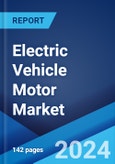Electric vehicle (EV) motors are machines that convert electrical energy into mechanical energy, propelling the vehicle forward. Unlike conventional internal combustion (IC) engines that rely on fossil fuels, they utilize electricity stored in the vehicle's battery. These motors are primarily available in two main types, namely alternating current (AC) and direct current (DC) motors. They are typically characterized by instant torque delivery, providing rapid acceleration from a standstill. This results in smooth, seamless power without the need for complex transmissions. They are also quieter and have fewer moving parts than their gasoline counterparts, reducing noise pollution and maintenance requirements. The evolution and refinement of EV motor technology continue to play a significant role in the transition towards sustainable transportation, contributing to reduced greenhouse gas emissions, improved energy efficiency, and decreased dependence on fossil fuels. As a result, electric vehicle motors are rapidly gaining traction across the globe due to the widespread adoption of EVs.
Electric Vehicle Motor Market Trends:
With the rising awareness about the adverse impacts of greenhouse gas emissions from traditional vehicles, there is a growing global interest in electric vehicles (EVs) that produce zero direct emissions. Consequently, the escalating production and sales of EVs owing to surging environmental concerns represents one of the primary factors driving the market growth. Moreover, governments of various countries worldwide are promoting the uptake of EVs through various favorable incentives, such as subsidies, tax rebates, and grants to combat air pollution and meet emission targets. In line with this, the increasing consumer preferences for clean energy vehicles due to inflating fuel prices are contributing to market growth. Furthermore, several leading automobile manufacturers are committing to electrifying their product lines to meet evolving customer needs. Along with this, heavy investments toward the expansion of charging infrastructure to ease range anxiety are propelling the market growth. Besides this, declining costs of lithium-ion batteries, coupled with advancements in battery technology, are making EVs a more viable transportation option. In addition, improvements in manufacturing processes have led to the miniaturization of electric motors that are lighter and more compact motors, enabling designers to create more spacious and practical interiors. Also, the escalating demand for high-performance and luxury vehicles is fueling market growth. Other factors, including the emerging shared mobility trend, rapid urbanization, inflating consumer purchasing power, and ongoing strategic collaborations between automakers and tech companies to stimulate technological innovations, are also supporting the market growth.Key Market Segmentation:
This report provides an analysis of the key trends in each segment of the global electric vehicle motor market, along with forecasts at the global, regional, and country levels from 2025-2033. The report has categorized the market based on power rating and application.Power Rating Insights:
- Up to 20 kW
- 20 kW to 100 kW
- 100 kW to 250 kW
- Above 250 kW
Application Insights:
- Two Wheeler
- Three Wheeler
- Passenger Vehicle
- BEV
- Hybrid
- Commercial Vehicle
- BEV
- Hybrid
Regional Insights:
- North America
- United States
- Canada
- Asia-Pacific
- China
- Japan
- India
- South Korea
- Australia
- Indonesia
- Others
- Europe
- Germany
- France
- United Kingdom
- Italy
- Spain
- Russia
- Others
- Latin America
- Brazil
- Mexico
- Others
- Middle East and Africa
Competitive Landscape:
The report has also provided a comprehensive analysis of the competitive landscape in the global electric vehicle motor market. Detailed profiles of all major companies have been provided. Some of the companies covered include ABB Ltd., BorgWarner Inc., Continental AG, Hitachi Astemo Ltd. (Hitachi Ltd.), Mitsubishi Electric Corporation, Robert Bosch GmbH, etc. Kindly note that this only represents a partial list of companies, and the complete list has been provided in the report.Key Questions Answered in This Report:
- How has the global electric vehicle motor market performed so far, and how will it perform in the coming years?
- What are the drivers, restraints, and opportunities in the global electric vehicle motor market?
- What is the impact of each driver, restraint, and opportunity on the global electric vehicle motor market?
- What are the key regional markets?
- Which countries represent the most attractive electric vehicle motor market?
- What is the breakup of the market based on the power rating?
- Which is the most attractive power rating in the electric vehicle motor market?
- What is the breakup of the market based on the application?
- Which is the most attractive application in the electric vehicle motor market?
- What is the competitive structure of the market?
- Who are the key players/companies in the global electric vehicle motor market?
Table of Contents
Companies Mentioned
- ABB Ltd.
- BorgWarner Inc.
- Continental AG
- Hitachi Astemo Ltd. (Hitachi Ltd.)
- Mitsubishi Electric Corporation
- Robert Bosch GmbH








